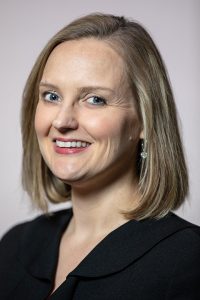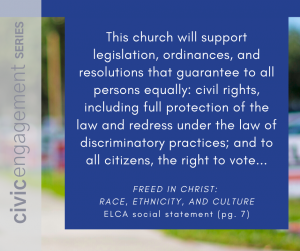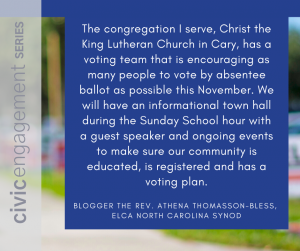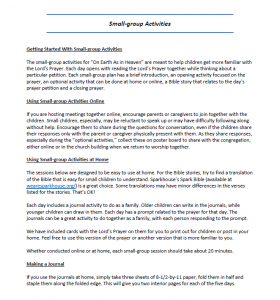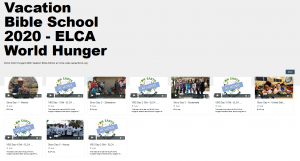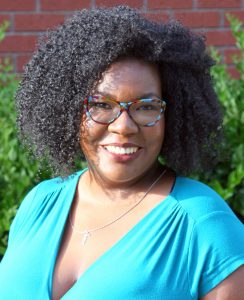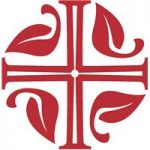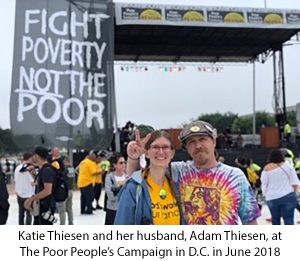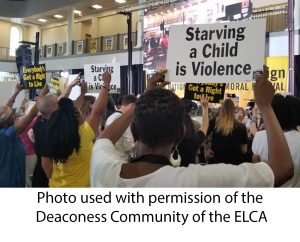Following are updates shared from submissions of the Lutheran Office for World Community and state public policy offices.
U.N. | Arizona | California | Colorado | Minnesota | Ohio | Pennsylvania | Texas | Washington | Wisconsin
Lutheran Office for World Community, United Nations, New York, N.Y. elca.org/lowc
Dennis Frado, director
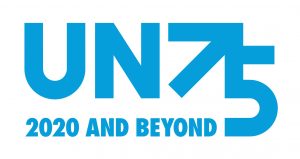 UN75 – 2020 AND BEYOND: The United Nations (UN) is marking its 75th anniversary this year. At the beginning of January 2020, it launched global conversations to listen to people’s experiences, fears, hopes as well as share the proposals and ideas that will shape the future for all. Everyone is asked to help in #ShapingOurFuture by joining the online dialogues. On May 14 -15, 2020, a virtual UN75 “People’s Forum for the UN We Need” was held. It brought together civil society and other stakeholders. The highlight of the forum was the handing over of the UN75 People’s Declaration and Plan for Global Action to the 74th President of the United Nations General Assembly, H.E. Mr. Tijjani Muhammad-Bande. Check out the UN75 2020 and beyond and UN2020 websites to see how you can participate.
UN75 – 2020 AND BEYOND: The United Nations (UN) is marking its 75th anniversary this year. At the beginning of January 2020, it launched global conversations to listen to people’s experiences, fears, hopes as well as share the proposals and ideas that will shape the future for all. Everyone is asked to help in #ShapingOurFuture by joining the online dialogues. On May 14 -15, 2020, a virtual UN75 “People’s Forum for the UN We Need” was held. It brought together civil society and other stakeholders. The highlight of the forum was the handing over of the UN75 People’s Declaration and Plan for Global Action to the 74th President of the United Nations General Assembly, H.E. Mr. Tijjani Muhammad-Bande. Check out the UN75 2020 and beyond and UN2020 websites to see how you can participate.
Arizona
Solveig Muus, Lutheran Advocacy Ministry Arizona (LAMA) director@lamaz.org
CONGREGATIONAL OUTREACH: LAMA’s policy team continues to reach out to each of our 85 Arizona congregations to learn how we might serve their needs. One church at a time, we are learning what each is passionate about, what community ministries each supports, and where there might be an advocacy call to action. We are learning a lot and are encouraged by the responses we receive.
COVID-19: As Arizona logged it’s highest single-day rise in coronavirus cases on June 3, we pray for all Arizonans, knowing the numbers are on the rise. In particular we pray for the Navajo Nation, which has seen 5,479 cases and 248 deaths among its 175,000 people, reporting the highest infection rate in the U.S. We thank God that 1,920 people have recovered from COVID-19, with more reports still pending .
This month, three of our team made videos for a Washington Interfaith Staff Community (WISC) campaign to move the Senate to act on a COVID-19 response, and we participated in a call with House Speaker Pelosi on coronavirus, housing and homelessness, and a call with U.S. Reps. Raul Grijalva and Tom O’Halleran on coronavirus crisis funding and recovery.
We continue to be blessed by God in so many ways! While our beloved nation is exhausted and in mourning, we know that God is in our midst at every turn, showing us a way forward.
California
Regina Q. Banks, Lutheran Office of Public Policy- California (LOPP-CA) lutheranpublicpolicyca.org
RACIAL JUSTICE: As our state reels from countless incidents of police violence and brutality against Black people and the legacy of white supremacy in this nation, we mourn, grieve, and advocate. We are supporting a bill to end racial discrimination in jury selection, and, along with coalition partners Green CA and Building the California Dream Alliance, pushing forward a larger list of bills related to racial equity and criminal justice reform. We lift up bail funds around the nation to support the voices, rights, and prophetic work of protesters. The Virginia Interfaith Center – one of our fellow state public policy offices – offers this list of resources for faith communities to fight racism.
BUDGET ADVOCACY—CALEITC EXANSION: The California Earned Income Tax Credit (CalEITC) is an essential piece of anti-poverty policy for Californians, but one group has been consistently excluded: undocumented tax filers. Immigrant tax filers contribute $3.2 billion to state and local taxes every year, yet they are ineligible to receive aspects of the safety net proving so essential in the midst of COVID-19. Along with coalition partners, including interfaith organizations, we have been pushing over the last months and years to expand the CalEITC. The governor’s recent budget proposals lacked this expansion, but in the Legislature’s version the expansion is included for undocumented tax filers with children under the age of six. There is still much work to be done to see this through. We thank all of our advocates fighting with us!
FOOD AND FARMING: Our priority bills are moving through the committee process, with some wins! Two of these support expanded and simplified access to CalFresh for seniors, people with disabilities, and people exiting the criminal justice system. We are partnering with Bread for the World in sponsoring one of these bills. We are also following a bill affecting farmworker communities in conjunction with frontline farmworker and immigrant rights organizations. Our CalEITC advocacy and our work with ELCA AMMPARO also intersect with our food and farming work.
FEDERAL HEROES ADVOCACY: We mobilized our network to advocate for more coronavirus relief for people who have lost their jobs or who are already living on the edge. HEROES, which originated in the US House of Representatives, was thought to be dead on arrival at the US Senate. But concerted efforts of advocacy groups and citizens across the nation have moved the Senate to take up the bill, which would provide relief to state and local governments (of particular importance to California’s State Budget) and increase SNAP benefits as well as other food access programs.
END CHILD POVERTY CAMPAIGN: Several members of Lutheran churches throughout California joined virtual district meetings with federal lawmakers in May, urging strong support of policy recommendations shown to reduce childhood poverty. We were encouraged by the efforts and support of Congressmembers Adam Schiff, Ted Lieu, Anna Eshoo, Rosa DeLauro, Jimmy Gomez, and others.
ADVOCACY IN QUARANTINE: We continue to host our weekly Wednesdays at Noon briefing on state and federal legislation and call to action. This month, we have supported racial justice priorities, CalEITC expansion, CalFresh access, the HEROES Act, and rental assistance.
GOD’S WORK, OUR HANDS, OUR VOICES: Our Lobby Day was postponed until September due to the special nature of the current legislative session. Look forward to an advocacy component to God’s Work, Our Hands Sunday!
Colorado
Peter Severson, Lutheran Advocacy Ministry-Colorado www.lam-co.org
LEGISLATURE RETURNS: The Colorado General Assembly is back at the Capitol. Their focus in the limited two- to three-week window will be the state budget. All bills with new spending that were pending in March have been killed, leaving only the budget and items with no cost attached.
Several bills that we were waiting for have been killed, including:
- HB 1081, Multilingual Ballot Access – bill on which we advocated during our advocacy day in February to translate ballots into more languages.
- HB 1203, Helping Colorado Families Get Ahead – bill to expand the EITC and Child Tax Credit. We expect a different version of the bill to come back next year.
However, we are still supporting several bills that are under consideration, including:
- SB 029, Cost of Living Adjustment for Colorado Works – bill to tie TANF/Colorado Works funds to increase with inflation.
- HB 1332, Prohibit Housing Source of Income Discrimination – specifies that housing providers must accept any legal source of income and not discriminate.
- A new bill related to Paid Sick Days, which we expect to be introduced soon.
RECOVER COLORADO: We’re part of a coalition called Recover Colorado, advocating that the legislature use state budget reserves appropriately, that Congress provide federal aid to supplement the state budget and that the legislature pass a temporary tax measure to raise substantial revenue.
Minnesota
Tammy Walhof, Lutheran Advocacy- Minnesota (LA-MN) lutheranadvocacymn.org
Work continues on LA-MN policy priorities, as well as responses to COVID-19 and racial justice issues. Director Tammy Walhof shared a Modern-Day Psalm of Lament on Facebook on May 31, then added that since writing it the community had seen: “thousands of people into the streets to help with clean-up. It’s brought piles of donations, and an outpouring of concern for the neighborhoods and businesses that have been decimated. Sunday, thousands and thousands of peaceful protesters are marching in various groups throughout the Metro Twin Cities, honoring the memory of George Floyd and calling for the hard work of reconciliation. These first steps are the work of the Holy Spirit! (Unfortunately, some violence continues). Moving forward, may we all strive to live God’s justice, peace, and love with one another.”
OHIO
Deacon Nick Bates, Hunger Network in Ohio hungernetohio.com
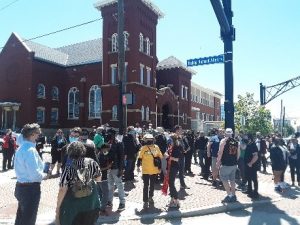 FIGHTING RACISM: Lutherans across Ohio mourn with the family of George Floyd and have participated in a series of non-violent protests, vigils, and marches in late May. We will continue to do the hard work of not only avoiding racism, but actively train ourselves to be anti-racists and address the systemic barriers to forming a beloved community. If you would like to get involved in anti-racism work, please contact us.
FIGHTING RACISM: Lutherans across Ohio mourn with the family of George Floyd and have participated in a series of non-violent protests, vigils, and marches in late May. We will continue to do the hard work of not only avoiding racism, but actively train ourselves to be anti-racists and address the systemic barriers to forming a beloved community. If you would like to get involved in anti-racism work, please contact us.
BALANCED APPROACH TO BUDGETING: Ohio’s governor has already cut $775 million from our state budget due to falling revenues. Advocates continue to push for a balanced approach to budgeting by using our state rainy day fund and seeking new revenue to help our schools, communities and essential public services through this.
Advocates are pleased that families struggling with hunger will have a few extra dollars this summer to use in grocery stores through expanded SNAP benefits for many Ohio households.
Pennsylvania
Tracey DePasquale, Lutheran Advocacy Ministry–Pennsylvania (LAMPa) lutheranadvocacypa.org
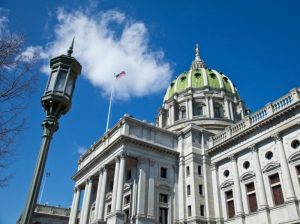 Stopgap Budget Sees Increase For Hunger Funding: Gov. Wolf signed a five-month stopgap spending plan, flat-funding programs from general revenues as the COVID-19 impact was anticipated to create a $5 billion shortfall in anticipated state revenue. The plan increases expenditures for hunger, housing and a host of other relief and recovery programs through federal CARES Act funding. At $50 million, the package more than doubles funding for anti-hunger efforts through the State Food Purchase Program and the Pa. Agricultural Surplus System. Extra funding to help struggling dairy farmers can direct another $5 million into the charitable food system. LAMPa advocates were vocal in calling for this much-needed support.
Stopgap Budget Sees Increase For Hunger Funding: Gov. Wolf signed a five-month stopgap spending plan, flat-funding programs from general revenues as the COVID-19 impact was anticipated to create a $5 billion shortfall in anticipated state revenue. The plan increases expenditures for hunger, housing and a host of other relief and recovery programs through federal CARES Act funding. At $50 million, the package more than doubles funding for anti-hunger efforts through the State Food Purchase Program and the Pa. Agricultural Surplus System. Extra funding to help struggling dairy farmers can direct another $5 million into the charitable food system. LAMPa advocates were vocal in calling for this much-needed support.
Emergency Feeding: LAMPa advocates successfully urged policymakers to allow Pennsylvania to pilot a program to allow recipients of the Supplemental Nutrition Assistance Program (SNAP) to purchase groceries online as a safer alternative for especially vulnerable individuals and households. That pilot has begun. In addition, hunger leaders effectively encouraged 13 of their 18 members of Congress to sign on to a “Dear Colleague” letter, urging extension of waivers of in-person visits for the Women, Infants and Children and The Emergency Food Assistance Program. LAMPa invited synods and hunger leaders to contact us about any service ministries disrupted by civil unrest.
Child Nutrition: Lutheran hunger leaders reached out to members of Congress to urge the USDA to extend waivers to allow schools and other providers to continue serving meals throughout the summer in non-congregate settings. The waiver was approved. LAMPa’s network also shared information encouraging families who lost income to sign up for free and reduced-price school meals so that their children might be eligible for additional pandemic-related nutrition support.
Collaboration: Director Tracey DePasquale addressed the role of faith-based advocacy as stewardship of citizenship in a virtual gathering for Lutherans Restoring Creation. She also collaborated with Lutheran Disaster Response in NEPA and SEPA synods on a webinar for those engaged in ministries with vulnerable populations in the time of COVID-19.
 Hearing on Draft Social Message: Although we were unable to gather in person for our annual Lutheran Day in the Capitol, our keynote, the Rev. Dr. Roger Willer, led a virtual hearing on “Government and Civic Engagement: Discipleship in a Democracy.”
Hearing on Draft Social Message: Although we were unable to gather in person for our annual Lutheran Day in the Capitol, our keynote, the Rev. Dr. Roger Willer, led a virtual hearing on “Government and Civic Engagement: Discipleship in a Democracy.”
Texas
Bee Moorhead, Texas Interfaith Center for Public Policy texasimpact.org
COVID-19 RESPONSE: In May, Texas Impact began resourcing local congregations to share best practices on responding to the COVID-19 crisis and equipping members to advocate for solutions to unmet needs. We ended the month compiling sermons and statements opposing systemic racism and making plans for a legislative package to respond.
Texas Impact is adapting our Treasure Hunt pilot program to equip two congregations to study the local impact of the COVID-19 pandemic, identify emergency resources, and determine next steps for advocacy. Legislative Engagement Group leaders were trained in May to begin monthly meetings in their legislative district (by Zoom for now) as a group and with their state house district office. The initial meetings focus on how congregations can partner with legislators to respond to the COVID-19 pandemic.
The weekly e-news has continued to highlight denominational leaders, including all three Texas ELCA Bishops, who continue to recommend congregations listen to the advice of public health officials. Texas ELCA bishops have been leaders throughout the COVID-19 crisis, helping to resource other denominational leaders throughout the state.
WEEKLY WITNESS PODCAST: This month Texas Impact continued the Weekly Witness podcast series featuring speakers from the Washington Interfaith Staff Community (WISC), which will include an appearance by John Johnson in June.
“TEXAS FAITH VOTES”: Texas Impact launched a “Texas Faith Votes” campaign, organizing Texans of faith to pledge to vote based on four priorities (health, climate, immigration and non-discrimination) and organizing congregations to promote vote by mail options for eligible voters.
The news can be discouraging, but we find hope in the leadership of Texas faith leaders and the level of engagement of Texans of faith.
Washington
Paul Benz and Elise DeGooyer, Faith Action Network fan@fanwa.org
 STATEMENT AGAINST POLICE BRUTALITY AGAINST PEOPLE OF COLOR: Faith Action Network joins with many across this nation in deploring the latest murders of Black Americans by police and in calling out for justice. We speak the names of the victims of this recent racist violence and we grieve for their families, their communities, and our nation. We mourn with our communities around the state as peaceful protests are met with riot gear, and we stand in solidarity with nonviolent efforts for justice. See our full statement here.
STATEMENT AGAINST POLICE BRUTALITY AGAINST PEOPLE OF COLOR: Faith Action Network joins with many across this nation in deploring the latest murders of Black Americans by police and in calling out for justice. We speak the names of the victims of this recent racist violence and we grieve for their families, their communities, and our nation. We mourn with our communities around the state as peaceful protests are met with riot gear, and we stand in solidarity with nonviolent efforts for justice. See our full statement here.
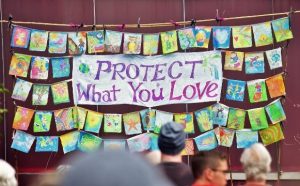 “PROTECT WHAT YOU LOVE” – FAN’S 9th ANNIVERSARY: We are celebrating our 9th anniversary as an organization on June 11, with the theme “Protect What You Love.” In tumultuous times with the concurrent viruses of racism and COVID-19, it is vital that we protect the communities and institutions that we love. COVID-19 exposed the fragile support systems that fail to guarantee our neighbors the right to economic stability, housing, food, safety, and healthcare. As our state considers its upcoming budget and the federal government considers new relief packages, we “Protect What We Love” by strengthening programs like SNAP, creating new programs like the Undocumented Worker Relief Fund, and advocating more funding for vulnerable communities, NOT cuts to social services. FAN is raising funds to support this ongoing work which will be matched up to $8500 through June 11.
“PROTECT WHAT YOU LOVE” – FAN’S 9th ANNIVERSARY: We are celebrating our 9th anniversary as an organization on June 11, with the theme “Protect What You Love.” In tumultuous times with the concurrent viruses of racism and COVID-19, it is vital that we protect the communities and institutions that we love. COVID-19 exposed the fragile support systems that fail to guarantee our neighbors the right to economic stability, housing, food, safety, and healthcare. As our state considers its upcoming budget and the federal government considers new relief packages, we “Protect What We Love” by strengthening programs like SNAP, creating new programs like the Undocumented Worker Relief Fund, and advocating more funding for vulnerable communities, NOT cuts to social services. FAN is raising funds to support this ongoing work which will be matched up to $8500 through June 11.
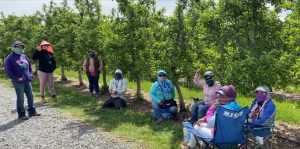 YAKIMA FARMWORKER STRIKE: FAN supports the efforts of farm workers in Yakima who have been on strike for weeks for protections against COVID-19. Yakima is the county most affected by COVID-19 on the west coast, and the health of our food laborers is vital to the health of all. Volunteers have been delivering homemade masks and forming caravans to join the protestors this month. After a significant advocacy effort by many groups, the governor is requiring all food packing employers to provide PPE and sanitizing stations in all parts of the workplace.
YAKIMA FARMWORKER STRIKE: FAN supports the efforts of farm workers in Yakima who have been on strike for weeks for protections against COVID-19. Yakima is the county most affected by COVID-19 on the west coast, and the health of our food laborers is vital to the health of all. Volunteers have been delivering homemade masks and forming caravans to join the protestors this month. After a significant advocacy effort by many groups, the governor is requiring all food packing employers to provide PPE and sanitizing stations in all parts of the workplace.
REGIONAL SPRING SUMMITS: Each Spring, FAN hosts four regional summits in Puget Sound, Southwest WA, Eastern WA, and Central WA. This year we have moved those meetings online but continue to host our familiar structure of legislative and congressional updates with a focus on justice issues our advocates would like to work on in the coming year, local advocacy efforts, breakout groups by issue topic, plus discussions on COVID-19 and the 2020 Census this year.
Wisconsin
Pastor Cindy Crane, Lutheran Office for Public Policy in Wisconsin (LOPPW) loppw.org
NEW INTERN: LOPPW welcomes Evan Sadlon, who will be entering his senior year at UW-Madison. He is majoring in religion and history with a minor in political science. He is an ELCA member doing his internship remotely from home in Illinois. He is also preparing for the LSAT this summer. Evan’s focus will be on care for God’s creation.
ELCA: Rev. Dr. Roger Willer moderated an excellent discussion on the draft of “Government and Civic Engagement: Discipleship in a Democracy” for Wisconsin and the UP via LOPPW.
WEDNESDAY NOON LIVE: LOPPW interviewed Nurse Elizabeth “Buffy” Riley, who lives in Hayward, WI. Recently, Buffy chose to help at a hospital in New York City. We also welcomed UpNorthNews Journalist Julian Emerson, who followed Buffy’s story.
SAFER AT HOME: The Director assisted the six bishops to organize a letter made up of their input on the WI Supreme Court’s decision to lift the Wisconsin Department of Health Services Safer at Home Order, and made the letter known. LOPPW also participated in the Lt. Governor’s conference calls and one call with the DHS.
HUNGER: LOPPW had a meeting with a food pantry coordinator in Eau Claire and then interviewed her about how to start a food pantry on FB live the following week. We also participated in a conference call with hunger leaders around the state and wrote an action alert about the new stimulus bill.
CONTINUING EDUCATION: Pr. Crane also attended the Festival of Homiletics in between meetings and other work.
